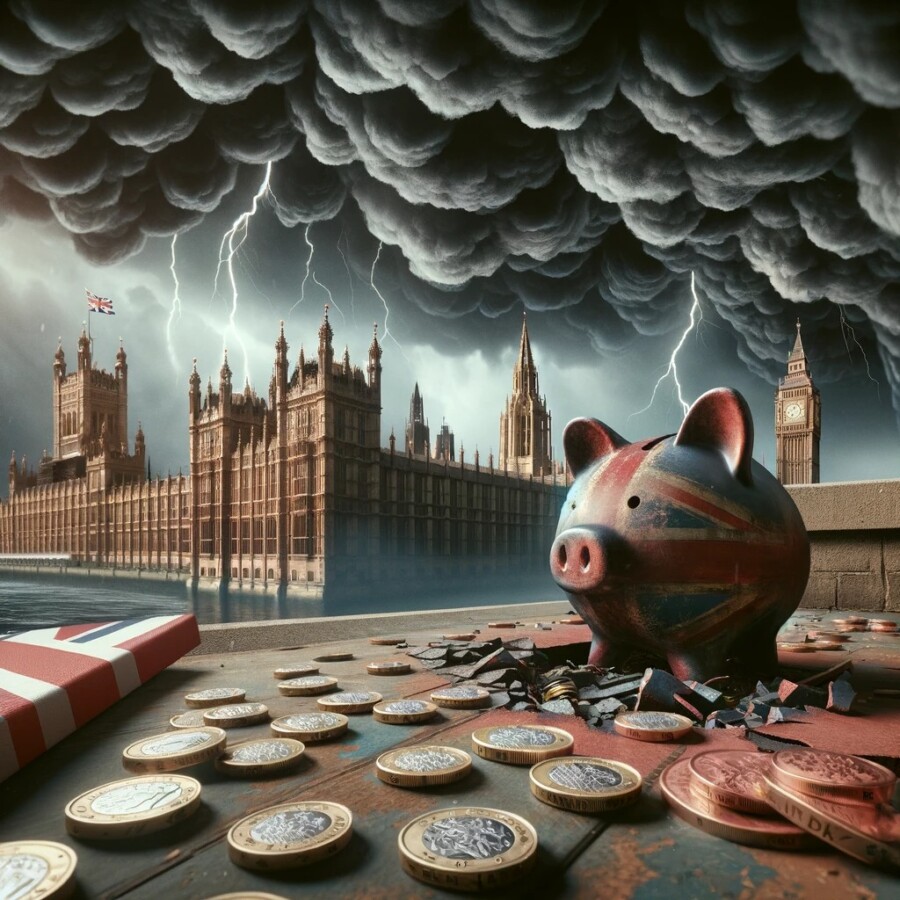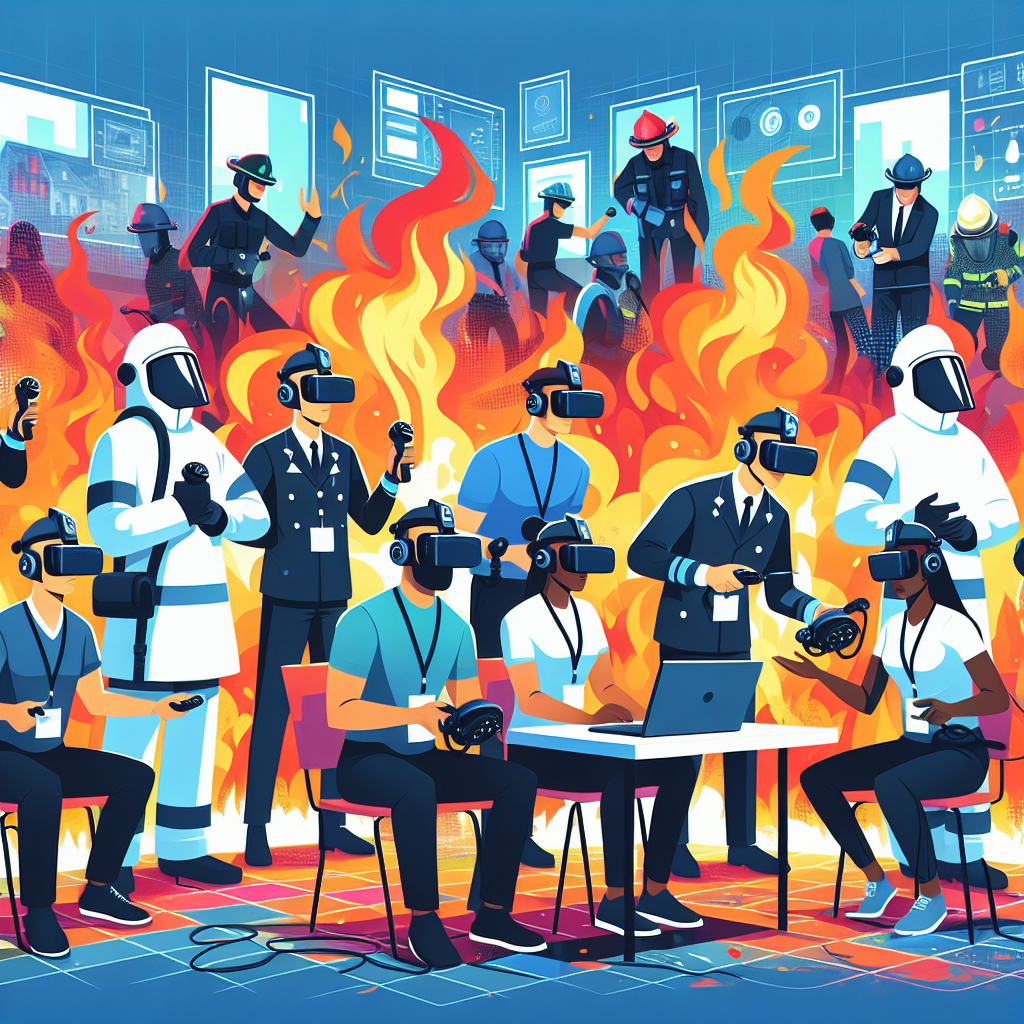The UK is facing the risk of a recession after new data revealed that the economy contracted between July and September. The revised figures showed a 0.1% shrinkage, contradicting previous estimates of flat growth. This follows zero growth between April and June, which was initially reported as a 0.2% increase. A recession is typically defined as two consecutive quarters of economic contraction. While concerns about the UK’s weak economic growth have been present for some time, the country has managed to avoid a recession until now. Economists predict that economic growth will remain subdued throughout 2024.
Economic growth is generally seen as positive because it leads to increased profitability for companies, more job opportunities, and higher wages. However, during periods of stagnant growth or recession, people tend to feel worse off. Unemployment rates can rise as companies reduce spending, making it harder for graduates and school leavers to find employment. With a general election scheduled for next year, the state of the economy is expected to be a key issue for all political parties.
The Bank of England has been raising interest rates in an attempt to curb inflation. However, the recent lower-than-expected inflation rate has sparked speculation that the Bank may cut interest rates in the spring of next year. Chancellor Jeremy Hunt remains optimistic about the medium-term outlook for the UK economy, while the shadow chancellor, Rachel Reeves, criticizes the prime minister for failing to stimulate economic growth. It will not be clear until February whether the UK has officially entered a recession, as the figures for the October to December quarter are yet to be released.
The latest data from the Office for National Statistics (ONS) suggests that rising interest rates have had a negative impact on consumer spending, which slowed during the period. Higher interest rates can reduce inflation and benefit savers, but they can also make borrowing money more expensive for consumers and businesses, affecting economic growth. The ONS also revised down its figures for the three months following additional information that showed weaker performances in sectors such as film production, engineering and design, telecommunications, and smaller businesses in the hospitality and IT sectors.
Compared to other G7 advanced economies, the UK has one of the weakest growth rates when comparing pre and post-Covid data. The UK’s economy is now 1.4% above its pre-pandemic level, compared to the previous 1.8% lead. Germany currently has the worst performing economy based on this measure. Retail sales data from the ONS showed that sales grew more than expected in November, boosted by Black Friday discounts. However, some retailers expressed concerns about the extended duration of the sales event and wider discounting practices.
Original news source: UK at risk of recession after economy shrinks (BBC)
🎧 Listen:
Slow
Normal
Fast
📖 Vocabulary:
| 1 | recession | A period of temporary economic decline during which trade and industrial activity are reduced |
| 2 | contracted | Became smaller or less extensive |
| 3 | shrinkage | The process of becoming smaller in size or amount |
| 4 | consecutive | Following one after another without interruption |
| 5 | subdued | Quiet and rather reflective or depressed |
| 6 | profitability | The state of yielding financial gain or benefit |
| 7 | stagnant | Not growing or developing |
| 8 | speculation | The act of forming theories or conjectures without firm evidence |
| 9 | optimistic | Hopeful and confident about the future |
| 10 | stimulate | Encourage or arouse interest or enthusiasm |
| 11 | savers | Individuals who save money rather than spend it |
| 12 | borrowing | The act of taking money that has been lent to you |
| 13 | hospitality | The business of providing food, drink, and accommodation for guests |
| 14 | advanced | Having a more developed or sophisticated level |
| 15 | discounting | The practice of reducing prices to encourage purchases |
Group or Classroom Activities
Warm-up Activities:
– News Summary
Instructions: In pairs or small groups, students will read the article and then work together to create a concise summary of the main points. They should focus on the key information, such as the UK’s contraction in the economy, the possibility of a recession, the impact on employment, and the role of interest rates. After they have finished their summaries, each group can share their findings with the class.
– Opinion Poll
Instructions: Divide the class into small groups. Each group will come up with a question related to the article, such as “Do you think the UK will enter a recession?” or “Should the Bank of England cut interest rates?” Each group will then conduct an opinion poll within the class, asking students to share their opinions and reasons behind their answers. After gathering the responses, each group can present their findings and engage in a class discussion about the different viewpoints.
– Vocabulary Pictionary
Instructions: Give each student a vocabulary word from the article, such as “recession,” “contraction,” or “inflation.” Students will then have a few minutes to draw a picture that represents the meaning of their assigned word. Once everyone has finished their drawings, students will take turns showing their pictures to the class. The rest of the class will guess the word based on the drawing and the student who drew it can confirm or provide additional hints if needed.
– Pros and Cons
Instructions: Students will work individually or in pairs to create a list of the pros and cons of the UK entering a recession. They should consider both the short-term and long-term effects on the economy, employment, and individuals. After they have finished their lists, students can discuss their ideas with a partner or in small groups, comparing and contrasting their perspectives. Finally, the class can come together for a whole-group discussion, sharing their thoughts and exploring different viewpoints.
– Future Predictions
Instructions: In pairs or small groups, students will discuss and make predictions about the future of the UK economy based on the information in the article. They should consider factors such as interest rates, government policies, and global economic trends. Each group will then present their predictions to the class, explaining their reasoning and supporting their ideas with evidence from the article or their own knowledge. The class can engage in a discussion, analyzing the different predictions and considering the potential outcomes.
🤔 Comprehension Questions:
1. What does it mean for an economy to contract?
2. How does stagnant economic growth or recession affect unemployment rates?
3. Why is the state of the economy expected to be a key issue in the upcoming general election?
4. Why has there been speculation that the Bank of England may cut interest rates?
5. What impact can rising interest rates have on consumer spending?
6. Which sectors of the UK economy showed weaker performances, according to the revised figures?
7. How does the UK’s growth rate compare to other G7 advanced economies?
8. What concerns did some retailers express about the Black Friday sales event?
Go to answers ⇩
🎧✍️ Listen and Fill in the Gaps:
The UK is facing the risk of a (1)______ after new data revealed that the economy contracted between July and September. The revised figures showed a 0.1% shrinkage, contradicting previous estimates of flat (2)______. This follows zero growth between April and June, which was initially reported as a 0.2% increase. A recession is typically defined as two consecutive quarters of economic (3)______. While concerns about the UK’s weak economic growth have been present for some time, the country has managed to avoid a recession until now. Economists predict that economic growth will remain (4)______ throughout 2024.
Economic growth is generally seen as positive because it leads to increased profitability for companies, more job opportunities, and higher wages. However, during periods of stagnant growth or recession, people tend to feel (5)______ off. Unemployment rates can rise as companies reduce spending, making it harder for graduates and school leavers to find employment. With a (6)______ election scheduled for next year, the state of the economy is expected to be a key issue for all political parties.
The Bank of England has been raising (7)______ rates in an attempt to curb inflation. However, the recent lower-than-expected inflation rate has sparked speculation that the Bank may cut interest rates in the spring of next year. Chancellor (8)______ Hunt remains optimistic about the medium-term outlook for the UK economy, while the shadow chancellor, (9)______ Reeves, criticizes the prime minister for failing to stimulate economic growth. It will not be clear until (10)______ whether the UK has officially entered a recession, as the figures for the October to December quarter are yet to be released.
The latest data from the Office for National Statistics (ONS) suggests that rising interest rates have had a negative impact on consumer spending, which slowed during the period. Higher interest rates can reduce inflation and benefit (11)______, but they can also make borrowing money more expensive for consumers and businesses, affecting economic growth. The ONS also revised down its figures for the three months following (12)______ information that showed weaker performances in sectors such as film production, engineering and design, telecommunications, and smaller businesses in the hospitality and IT sectors.
Compared to other G7 advanced (13)______, the UK has one of the weakest growth rates when comparing pre and post-Covid data. The UK’s economy is now 1.4% above its pre-pandemic level, compared to the previous 1.8% lead. Germany currently has the worst performing economy (14)______ on this measure. Retail sales data from the ONS showed that sales grew more than expected in November, boosted by Black Friday discounts. However, some retailers expressed (15)______ about the extended duration of the sales event and (16)______ discounting practices.
Go to answers ⇩
💬 Discussion Questions:
Students can ask a partner these questions, or discuss them as a group.
1. What is a recession and how does it affect the economy?
2. How would you feel if you were unable to find a job due to a recession?
3. Do you think economic growth is always positive? Why or why not?
4. How do rising interest rates impact consumer spending?
5. Why do you think the UK has one of the weakest growth rates compared to other G7 economies?
6. How do you think the upcoming general election will affect the state of the UK economy?
7. What impact do you think inflation has on the economy?
8. How do you think the government can stimulate economic growth during a recession?
9. Do you think cutting interest rates is an effective strategy to boost the economy? Why or why not?
10. How do you think the weak economic growth in the UK will affect job opportunities for graduates and school leavers?
11. How do you think the extended duration of sales events, like Black Friday, impact the economy?
12. How do you think the recession in the UK will affect the global economy?
13. What measures do you think the government should take to prevent a recession?
14. How do you think the recession will affect the average person’s daily life?
15. Do you think the UK will be able to recover from the recession? Why or why not?
Individual Activities
📖💭 Vocabulary Meanings:
Match each word to its meaning.
Words:
1. recession
2. contracted
3. shrinkage
4. consecutive
5. subdued
6. profitability
7. stagnant
8. speculation
9. optimistic
10. stimulate
11. savers
12. borrowing
13. hospitality
14. advanced
15. discounting
Meanings:
(A) The practice of reducing prices to encourage purchases
(B) Having a more developed or sophisticated level
(C) The process of becoming smaller in size or amount
(D) The act of taking money that has been lent to you
(E) Became smaller or less extensive
(F) The state of yielding financial gain or benefit
(G) Individuals who save money rather than spend it
(H) Not growing or developing
(I) A period of temporary economic decline during which trade and industrial activity are reduced
(J) Encourage or arouse interest or enthusiasm
(K) The act of forming theories or conjectures without firm evidence
(L) The business of providing food, drink, and accommodation for guests
(M) Hopeful and confident about the future
(N) Quiet and rather reflective or depressed
(O) Following one after another without interruption
Go to answers ⇩
🔡 Multiple Choice Questions:
1. What is the definition of a recession?
(a) Two consecutive quarters of economic growth
(b) Two consecutive quarters of economic contraction
(c) A period of stagnant economic growth
(d) A period of high inflation
2. Why is economic growth generally seen as positive?
(a) It leads to decreased profitability for companies, fewer job opportunities, and lower wages
(b) It has no impact on companies, job opportunities, or wages
(c) It only benefits the government and has no impact on individuals
(d) It leads to increased profitability for companies, more job opportunities, and higher wages
3. How has rising interest rates affected consumer spending?
(a) It has had a positive impact and increased consumer spending
(b) It has had no impact on consumer spending
(c) It has had a negative impact and slowed consumer spending
(d) It is unclear how rising interest rates have affected consumer spending
4. Which sector(s) showed weaker performances according to the Office for National Statistics (ONS)?
(a) Retail, healthcare, and finance sectors
(b) Film production, engineering and design, telecommunications, and smaller businesses in the hospitality and IT sectors
(c) Manufacturing, agriculture, and construction sectors
(d) Education, transportation, and energy sectors
5. How does the UK’s growth rate compare to other G7 advanced economies?
(a) It is one of the weakest growth rates
(b) It is one of the strongest growth rates
(c) It is average compared to other G7 economies
(d) It is impossible to compare the UK’s growth rate to other G7 economies
6. What event boosted retail sales in November?
(a) Cyber Monday discounts
(b) Christmas sales
(c) Black Friday discounts
(d) Back-to-school sales
7. What is the main concern expressed by some retailers about Black Friday?
(a) The extended duration of the sales event
(b) The lack of discounts
(c) The lack of customer interest
(d) The impact on their profit margins
8. When will it be clear whether the UK has officially entered a recession?
(a) January, when the figures for the October to December quarter are released
(b) March, when the figures for the January to March quarter are released
(c) It is already clear that the UK has officially entered a recession
(d) February, when the figures for the October to December quarter are released
Go to answers ⇩
🕵️ True or False Questions:
1. The latest data suggests that rising interest rates have had a positive impact on consumer spending in the UK.
2. The UK’s economy is currently 1.4% above its pre-pandemic level, compared to the previous 1.8% lead.
3. A recession is typically defined as two consecutive quarters of economic expansion.
4. The Bank of England may cut interest rates in the spring of next year due to lower-than-expected inflation.
5. The UK’s economy contracted between July and September, contradicting previous estimates of flat growth.
6. Stagnant growth or recession can lead to higher unemployment rates.
7. Economists predict that economic growth in the UK will be robust throughout 2024.
8. This expansion in the economy follows zero growth between April and June.
Go to answers ⇩
📝 Write a Summary:
Write a summary of this news article in two sentences.
Check your writing now with the best free AI for English writing!
Writing Questions:
Answer the following questions. Write as much as you can for each answer.
Check your answers with our free English writing assistant!
1. What does it mean for an economy to be in a recession?
2. How has stagnant economic growth or recession affected employment rates in the UK?
3. Why has there been speculation that the Bank of England may cut interest rates?
4. What sectors of the UK economy have shown weaker performances, according to the Office for National Statistics?
5. How does the UK’s economic growth rate compare to other G7 advanced economies?
✅ Answers
🤔✅ Comprehension Question Answers:
1. What does it mean for an economy to contract?
– When an economy contracts, it means that it is experiencing a decline in economic activity and output. This is typically measured by a decrease in the country’s Gross Domestic Product (GDP).
2. How does stagnant economic growth or recession affect unemployment rates?
– Stagnant economic growth or a recession can lead to higher unemployment rates. During these periods, companies may reduce spending and cut jobs, making it more difficult for individuals, especially graduates and school leavers, to find employment.
3. Why is the state of the economy expected to be a key issue in the upcoming general election?
– The state of the economy is expected to be a key issue in the upcoming general election because it directly affects people’s livelihoods and well-being. Voters are likely to be concerned about job opportunities, wages, and overall economic stability, making it an important topic for political parties to address.
4. Why has there been speculation that the Bank of England may cut interest rates?
– There has been speculation that the Bank of England may cut interest rates because of the recent lower-than-expected inflation rate. Lowering interest rates can help stimulate economic growth by making borrowing money cheaper for consumers and businesses.
5. What impact can rising interest rates have on consumer spending?
– Rising interest rates can have a negative impact on consumer spending. Higher interest rates can make borrowing money more expensive, which can reduce consumers’ ability or willingness to spend. This can lead to a decrease in consumer demand and slower economic growth.
6. Which sectors of the UK economy showed weaker performances, according to the revised figures?
– According to the revised figures, sectors such as film production, engineering and design, telecommunications, and smaller businesses in the hospitality and IT sectors showed weaker performances.
7. How does the UK’s growth rate compare to other G7 advanced economies?
– The UK has one of the weakest growth rates compared to other G7 advanced economies. The UK’s economy is currently 1.4% above its pre-pandemic level, which is lower than the previous 1.8% lead. Germany currently has the worst performing economy based on this measure.
8. What concerns did some retailers express about the Black Friday sales event?
– Some retailers expressed concerns about the extended duration of the Black Friday sales event and wider discounting practices. They may worry that these practices could negatively impact their profit margins and overall sales performance.
Go back to questions ⇧
🎧✍️✅ Listen and Fill in the Gaps Answers:
(1) recession
(2) growth
(3) contraction
(4) subdued
(5) worse
(6) general
(7) interest
(8) Jeremy
(9) Rachel
(10) February
(11) savers
(12) additional
(13) economies
(14) based
(15) concerns
(16) wider
Go back to questions ⇧
📖💭✅ Vocabulary Meanings Answers:
1. recession
Answer: (I) A period of temporary economic decline during which trade and industrial activity are reduced
2. contracted
Answer: (E) Became smaller or less extensive
3. shrinkage
Answer: (C) The process of becoming smaller in size or amount
4. consecutive
Answer: (O) Following one after another without interruption
5. subdued
Answer: (N) Quiet and rather reflective or depressed
6. profitability
Answer: (F) The state of yielding financial gain or benefit
7. stagnant
Answer: (H) Not growing or developing
8. speculation
Answer: (K) The act of forming theories or conjectures without firm evidence
9. optimistic
Answer: (M) Hopeful and confident about the future
10. stimulate
Answer: (J) Encourage or arouse interest or enthusiasm
11. savers
Answer: (G) Individuals who save money rather than spend it
12. borrowing
Answer: (D) The act of taking money that has been lent to you
13. hospitality
Answer: (L) The business of providing food, drink, and accommodation for guests
14. advanced
Answer: (B) Having a more developed or sophisticated level
15. discounting
Answer: (A) The practice of reducing prices to encourage purchases
Go back to questions ⇧
🔡✅ Multiple Choice Answers:
1. What is the definition of a recession?
Answer: (b) Two consecutive quarters of economic contraction
2. Why is economic growth generally seen as positive?
Answer: (d) It leads to increased profitability for companies, more job opportunities, and higher wages
3. How has rising interest rates affected consumer spending?
Answer: (c) It has had a negative impact and slowed consumer spending
4. Which sector(s) showed weaker performances according to the Office for National Statistics (ONS)?
Answer: (b) Film production, engineering and design, telecommunications, and smaller businesses in the hospitality and IT sectors
5. How does the UK’s growth rate compare to other G7 advanced economies?
Answer: (a) It is one of the weakest growth rates
6. What event boosted retail sales in November?
Answer: (c) Black Friday discounts
7. What is the main concern expressed by some retailers about Black Friday?
Answer: (a) The extended duration of the sales event
8. When will it be clear whether the UK has officially entered a recession?
Answer: (d) February, when the figures for the October to December quarter are released
Go back to questions ⇧
🕵️✅ True or False Answers:
1. The latest data suggests that rising interest rates have had a positive impact on consumer spending in the UK. (Answer: False)
2. The UK’s economy is currently 1.4% above its pre-pandemic level, compared to the previous 1.8% lead. (Answer: True)
3. A recession is typically defined as two consecutive quarters of economic expansion. (Answer: False)
4. The Bank of England may cut interest rates in the spring of next year due to lower-than-expected inflation. (Answer: True)
5. The UK’s economy contracted between July and September, contradicting previous estimates of flat growth. (Answer: True)
6. Stagnant growth or recession can lead to higher unemployment rates. (Answer: True)
7. Economists predict that economic growth in the UK will be robust throughout 2024. (Answer: False)
8. This expansion in the economy follows zero growth between April and June. (Answer: False)
Go back to questions ⇧













